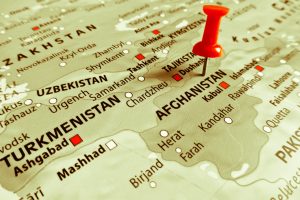David J. Kramer, Natalie Gonnella-Platts, and Jessica Ludwig

The United States cannot afford to neglect the intense suffering and exploitation of the population of Afghanistan since the Taliban seized the state over two years ago.
The Taliban’s extremism, misogyny, and brutality are actively undermining Afghanistan’s prospects for peace and stability. Fundamental to this vicious pursuit of power is the strategic use of corruption and kleptocracy to cement loyalty among the Taliban’s ranks, punish Afghans who refuse to comply, and, most especially, line leaders’ own pockets.
Although international leverage has changed, the United States and the global community must take a more definitive role in confronting the Taliban’s atrocities. The revenue streams the Taliban use to reward themselves represent the biggest untapped pressure point that the United States and the global community can target, as the George W. Bush Institute stated in a letter to the House Foreign Affairs Committee’s Subcommittee on the Middle East, North Africa, and Central Asia last week.
The Bush Institute remains steadfast in our solidarity with and support for the Afghan people, especially women and children, and we urge Congress and the administration to work together to hold the Taliban accountable.
For 20 years, brave Afghans partnered with the United States and our allies in the pursuit of peace and stability for all. Like people around the world, Afghans simply want to live in freedom and create a brighter future for their families and communities.
Corruption has featured prominently throughout Afghanistan’s history and was a significant contributing factor to the rapid collapse of democracy in Afghanistan. However, the Taliban should be measured against their own claims that they would eliminate corruption.
Since retaking power, the Taliban have leveraged their takeover of the state bureaucracy to expand the security apparatus, award government licenses and jobs to Taliban members and their families, and extort taxes, bribes, and valuable services from the Afghan population and the private sector. They have manipulated and siphoned the distribution of humanitarian aid and exploited their control over the country’s resources to their own benefit.
The Taliban continue to profit from the trafficking of drugs, weapons, and military equipment, as well as from human trafficking, forced marriage, and child labor, upending innocent lives.
Educators, artists, musicians, students, journalists, and activists have been detained, tortured, and often silenced. Former government officials, security forces, advocates, and ethnic and religious minorities have been hunted, imprisoned, and killed by the Taliban and other extremists with few if any repercussions.
Nearly 60 percent of the Afghan population is in need of lifesaving humanitarian assistance, according to USAID, and the economy is on the brink of collapse.
No one has paid a greater price for the Taliban’s greed and unrelenting pursuit of power and control than Afghan women and children.
Barred from secondary and higher education, employment, and freedom of movement, Afghan women’s well-being has been suffocated under the Taliban’s brutal enforcement of gender apartheid; women are denied agency over their lives.
Taliban officials and their loyalists have intentionally ignored, manipulated, and eroded critical infrastructure, including schools, hospitals, clinics, and other essential services.
As a result, families face what the United Nations has described as “unparalleled” levels of malnutrition and food insecurity. This includes an estimated 4 million children under 5 and breastfeeding and pregnant women who need lifesaving nutrition support.
Preventable and curable illnesses have surged, tragically claiming the lives of at least 167 Afghan children every day, according to UNICEF and the World Health Organization.
At the same time, sanctioned Taliban leaders have applied for and been granted travel ban and asset freeze exemptions by the U.N. Security Council for medical treatment in countries like Turkey because adequate care isn’t available in Afghanistan. Incredibly, the United States voted in favor of granting these and other travel ban exemptions to sanctioned Taliban leaders.
Access to justice for women and girls fleeing violence and abuse has been ferociously dismantled in favor of an archaic interpretation of Shariah law that often rewards and incentivizes abusers. Women are subjugated, victimized, and revictimized across every facet of the Taliban’s vision for Afghanistan.
Many of those who have escaped the horrors of the Taliban’s autocracy face additional challenges as visa pathways and permanent resettlement options remain out of reach, despite significant risk of persecution based on both their gender and their prior work in support of a free and democratic future in Afghanistan.
It doesn’t have to be this way.
The United States and its allies should expand anti-corruption sanctions; use the Global Magnitsky Act on Taliban leadership; and designate the Taliban as a Foreign Terrorist Organization and Afghanistan as a Primary Money Laundering Concern under the USA Patriot Act, Section 311. These designations would have important cascading effects limiting the ability of corrupt Taliban officials to profit from business deals or maneuver looted funds to enrich themselves or to fund extremist activities.
U.S. government representatives must include and advocate for participation by a wider range of Afghan stakeholders in all convenings, hearings, and negotiations focusing on the future of Afghanistan. They should also regularly consult with women, ethnic and religious minorities, civil society leaders, and members of the Afghan diaspora, prioritizing intergenerational, regional, and socioeconomic diversity.
The United States should also support organizations and initiatives that collect data and amplify the perspectives of Afghan women and other marginalized communities while shedding light on the Taliban’s behavior and expenditures.
American leadership remains imperative to reining in the Taliban’s atrocities. Congress and the president should act today.
No comments:
Post a Comment